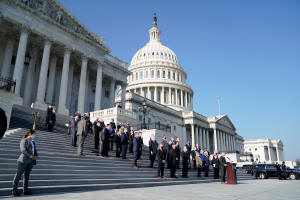U.S. Senate vote on spending could slip to Friday, Pelosi suggests
longer COVID-19 timeline
 Send a link to a friend
Send a link to a friend
 [December 11, 2020]
By Susan Cornwell and David Morgan [December 11, 2020]
By Susan Cornwell and David Morgan
WASHINGTON (Reuters) -A U.S. Senate vote on
a stopgap measure to keep the government running is likely to slip to
the Friday deadline, a leading Republican said, as a top Democrat
suggested wrangling over a spending package and coronavirus aid could
drag on through Christmas.
The Democratic-majority House of Representatives on Wednesday approved
the one-week stopgap measure to extend current government funding levels
until Dec. 18.
If passed by the Senate and signed by President Donald Trump, it would
prevent programs from running out of money on Friday at midnight (0500
GMT on Saturday) and closing.
The bill gives Congress seven more days to enact a broader, $1.4
trillion "omnibus" spending measure for all government agencies from the
Pentagon to national parks.

Congressional leaders hope to attach a long-awaited COVID-19 relief
package, the first since $3 trillion in aid was approved last spring to
help mitigate pandemic-related shutdowns, job losses and other
hardships.
The Senate's number two Republican, John Thune, told reporters Thursday
that the vote on the stopgap measure might not happen until Friday,
because some senators were holding up proceedings to request votes on
other matters.
Holdouts included Republican Senator Rand Paul, who often votes against
spending bills, and Senator Bernie Sanders, who wanted more money for
Americans.
"If there's cooperation we could, you know, finish those tonight but at
the moment it looks like we'll be here tomorrow," Thune said of the
stopgap spending measure and a separate defense bill.
Sanders, an independent who caucuses with Democrats, is seeking a
promise of a separate vote on a $1,200 direct payment in COVID-19 relief
to individuals, as had been done last March, his office said.
"Congress cannot adjourn for the holidays in order to return to our
families when so many other families are living in desperation. It is
absolutely imperative that we provide $1,200 for every working-class
adult and $500 for each of their children," Sanders said in a statement.
NEGOTIATE TILL CHIRSTMAS?
House Speaker Nancy Pelosi told reporters that Congress could work on a
COVID-19 relief package until Dec. 26, the day after Christmas, when a
range of emergency aid programs are set to expire.
[to top of second column]
|

U.S. House Minority Leader Kevin McCarthy (R-CA) holds a news
conference with other House Republicans at the U.S. Capitol in
Washington, U.S., December 10, 2020. REUTERS/Erin Scott

"Dec. 26, the unemployment insurance benefits expire. So some time
before then, hopefully that Dec. 18th date, we would like to have
this done," Pelosi, a Democrat, said.
"We cannot go home without it," she added. "We've been here after
Christmas, you know."
A bipartisan group of lawmakers is working on a COVID-19 relief
plan. But leading Republicans expressed doubt that the group could
agree on the thorniest issues: state and local aid sought by
Democrats, and liability protections for businesses sought by
Republicans.
"My sense is that they're not going to get there on the liability
language," Thune told reporters. He endorsed the remedy the Senate's
top Republican, Majority Leader Mitch McConnell had proposed two
days ago - drop the contentious issues for now and pass the rest.
The pandemic has roared back to levels surpassing those seen early
in the crisis, with more than 200,000 new infections reported each
day and fresh shutdowns in some areas. More than 286,000 Americans
have died of COVID-19 so far, and millions have been thrown out of
work.
Pelosi and Senate Democratic Leader Chuck Schumer say they view the
bipartisan group negotiations as the best hope for a COVID-19 deal.

That group released a summary of their $908 billion proposal
Wednesday. It would provide an extra $300 a week in supplemental
unemployment benefits for 16 weeks alone with aide for small
businesses, vaccine distribution, healthcare and education providers
and rental assistance.
A $916 billion proposal from Mnuchin on Tuesday included funds for
state and local governments and liability protections for
businesses. But Democrats criticized its lack of extra benefits for
the unemployed, while including $600 payments for all individuals.
(Reporting by Susan Cornwell; Editing by Scott Malone, Alistair Bell
and Cynthia Osterman)
[© 2020 Thomson Reuters. All rights
reserved.] Copyright 2020 Reuters. All rights reserved. This material may not be published,
broadcast, rewritten or redistributed.
Thompson Reuters is solely responsible for this content. |